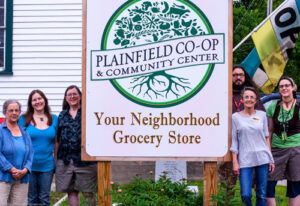
Was this newsletter forwarded to you? Subscribe here to keep up to date on NFCA News!
In this edition:
New Co-ops Breaking Ground!
Summer Internship
Supporting Rural Co-ops
Co-ops Vote!
September Cave to Co-op Special
Co-op Identity Survey
Partner Profile: ECRS
New England Farmers Union
Upcoming Events
New Co-ops Breaking Ground
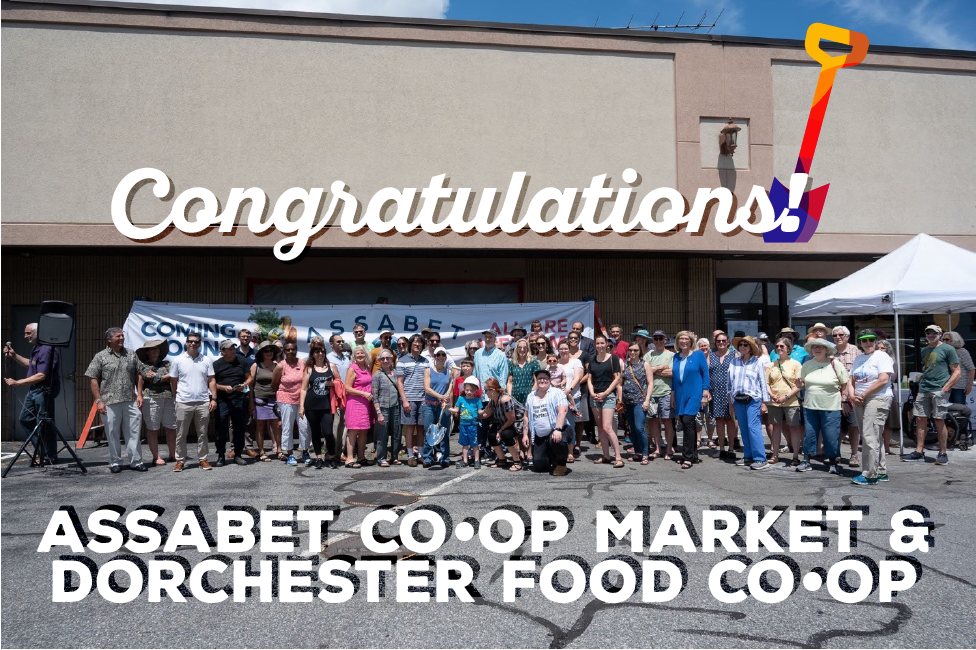
In July, two Massachusetts communities celebrated as they broke ground for their new food co-ops.
Central to the mission of the Neighboring Food Co-op Association (NFCA) is leveraging our shared experience and resources to support growth, innovation, and the successful launch of new food co-ops. For example, in partnership with Food Co-op Initiative (FCI) the NFCA has been working for almost a decade to support Assabet Co-op Market and Dorchester Food Co-op in Massachusetts to build grocery stores that will create sustainable jobs, markets for local producers, and community wealth. Through peer calls, trainings, and shared site visits, these two start-ups have supported each other’s organizing efforts and grown together, while sharing their experiences with other co-operative organizers.
In July, both of these initiatives held groundbreaking ceremonies as construction begins on two new food co-ops in our region. In Maynard, MA, community members gathered on July 8th as Assabet Co-op Market took another step toward realizing their dream of opening a full-service grocery store. With more than 2,000 founding members, the co-op will prioritize local producers, and is 100% democratically governed by the community.

Now is a great time to encourage your friends and family in the Maynard and Dorchester areas to join Assabet Co-op Market and Dorchester Food Co-op and be part of these inspirational efforts to build a more healthy, just, and sustainable food system. Visit their websites to learn more, including opportunities to participate in capital campaigns.
Bonnie Hudspeth coordinates the NFCA’s Co-operative Development Programs. She may be contacted at Bonnie@nfca.coop.
“This internship with the NFCA has made it exceedingly clear to me that my ultimate goal is to work at a co-op.”
 My path to working with the Neighboring Food Co-op Association (NFCA) came last-minute and unexpectedly, as I decided to pursue a Certificate in Applied Economic Research on Co-operative Enterprises with UMass Department of Economics just as my junior year was drawing to a close. In writing my application on what I might bring to and take away from an internship,
My path to working with the Neighboring Food Co-op Association (NFCA) came last-minute and unexpectedly, as I decided to pursue a Certificate in Applied Economic Research on Co-operative Enterprises with UMass Department of Economics just as my junior year was drawing to a close. In writing my application on what I might bring to and take away from an internship,
I emphasized my interest in the intersection of various academic spheres; my studies after arriving in Amherst three years ago have been an amalgamation of pre-medical sciences, language, and co-operative business models.
I was lucky enough to stumble upon and start working at Earthfoods Café a few months into my first semester, one of seven student-run co-ops on campus. There, I’ve learned about co-operative workplaces and what an alternative to the traditional hierarchical workplaces might look like and have continued to be inspired by the Co-operative Identity. Learning about this Certificate, I was determined to pursue it to learn all that I could about co-ops before I graduated.
At NFCA, my primary responsibilities were focused on food security and healthy food access. The two main projects that I worked on were the Vermont Food Security Plan project being coordinated by the Vermont Farm to Plate Network and the 2022 NFCA Healthy Food Access Survey. I was tasked with interviewing general managers of four Vermont co-ops to learn about varying food security initiatives and ensure that co-operatives were included in the Vermont Food and Agricultural Strategic Plan 2021-2030.
Through these interviews, I noted certain patterns and reported back common struggles and goals across co-ops. I noted that any difficulty reported by one food co-op was rarely unique; our co-ops have shared issues and a plethora of solutions that emphasized for me the importance of the work that NFCA does to create and foster connections and conversations among member co-operatives. I was lucky to be invited to sit in on the Association’s quarterly Healthy Food Access (HFA) calls and saw in those short but hugely informational sessions that every co-op had a passion for making healthy food truly accessible to all; participants shared their co-op’s difficulties and others generously offered strategies and resources to support them. For the first time, I directly experienced the benefits of the co-operative network and the difference between a traditional enterprise and the co-operative way of doing business. I also noted firsthand the shared fulfillment of being community-oriented and how appealing that was to me in a workplace and I began thinking of how I could apply co-op values in my working future.
During my studies at UMass Amherst, I have focused on medical humanities as a way of preparing for medical school, taking every class I could find on healthcare disparities, ethics, and accessibility especially regarding underprivileged and under-represented populations and communities. In my intersection of academic interests between medicine and language, I have focused on learning how to properly provide health services to underserved communities, especially those facing a language barrier. Examining this on a macro and micro scale, it was immediately clear that the disparities that exist have to be addressed on a systemic scale and I needed to prepare myself individually to be a physician that could properly serve these communities. To approach this from a food access lens as I did this summer through the NFCA was hugely educational for me; I saw that healthy food access was one of the most basic needs that was still a privilege rather than a right in the United States. I am proud to have been a part of the continued effort that NFCA advocates for to ensure that lower income and otherwise disadvantaged populations have affordable and accessible ways to find, buy, and consume healthy food efficiently and realistically.
My time working at NFCA this summer has given me a glimpse into co-operative business outside of a college campus, and I am grateful for the various opportunities I was given to learn about the model and work to aid in the effort to increase healthy food access for the NFCA member co-ops. On a larger scale, my internship came at the perfect time as I prepare to begin my senior year course load and begin to think about what it is I want to do not only post-graduation but in the long-term. I hope to attend medical school after a few gap years, and though a hefty goal, working with NFCA has made it exceedingly clear to me that my ultimate goal is to work at a co-op. Healthcare-related co-ops are still relatively rare in the e US, and that was one of my primary motivations for pursuing the Certificate in Co-operative Enterprise; going into the medical field, I had convinced myself that my undergraduate experience would be one of my last times being able to work at a co-op and I wanted to soak up all the knowledge I could. Contrary to that belief, this internship has sparked a newfound drive in me to create a path toward working at a co-operative.
The various conversations I have had the privilege of having regarding the importance of the co-operative business model have convinced me that nothing should stand in the way of my working to develop a functioning healthcare co-op. I feel fortunate to have had the opportunity to learn about co-ops outside of a college campus setting, and it has been enlightening and inspiring, convincing me that co-operative businesses are the future for a community-oriented way of working.
Yoojee Kim was a Summer intern with the Neighboring Food Co-op Association (NFCA), working on completion of the Certificate in Applied Research in Co-operative Enterprise at UMass Amherst Department of Economics, and hopes to develop a healthcare co-operative in the future. And we can’t wait to see it happen!
Partnering with the Cooperative Development Foundation to support our rural food co-ops.
Back in 2007, the founding visionaries of what would become the Neighboring Food Co-op Association (NFCA) signed “The Middlebury Manifesto,” a document outlining the vision of an organization that would “further the ideals of democracy, co-operation, autonomy and education as enshrined in the International Co-operative Principles.” Central to this idea was providing shared learning opportunities among co-ops, developing leadership and management capacity, and advancing knowledge to help “build a co-operative economy in our geographic region.”
In this spirit, the NFCA has been working with the Cooperative Development Foundation (CDF) on a USDA Rural Cooperative Development Grant over the past year to support small, rural food co-ops in the Northeast as they work to recover from the pandemic. The grant recognizes the important role these co-ops play in their local communities as well as the challenges they face in terms of their smaller scale, increased competition, limited resources, and lack of consistent technical support. The grant is enabling the NFCA to develop pilot programs to meet their training and technical assistance needs, supporting their success and strengthening local economies.
As a first step in the project, a needs assessment survey was distributed among Board Presidents and General Managers of rural co-ops in our region to help understand challenges and identify areas for support. Follow up interviews have offered an opportunity for deeper dialog and exploration of themes. Our next step is the development of pilot training programs focused on management support, governance training, community engagement and membership development. In addition to direct technical support and training, the programs will also include online resources specific to the needs identified.
As we look toward 2023, we’re excited to continue this collaborative work as we bring together rural food co-ops to support shared success and impact for their communities.
Alexis Alexander provides Peer Networking and Technical Support to the NFCA and its member co-ops. E-mail her at Alexis@nfca.coop.

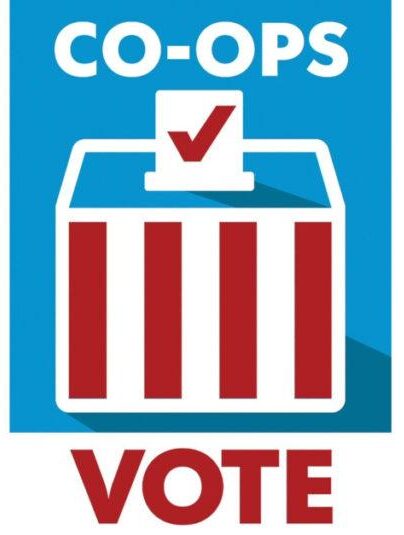 Neighboring Food Co-op Association joins National Voter Registration Day celebration on September 20, encouraging co-ops and their members to support participation in elections this fall and spread the word: Co-ops Vote!
Neighboring Food Co-op Association joins National Voter Registration Day celebration on September 20, encouraging co-ops and their members to support participation in elections this fall and spread the word: Co-ops Vote!
As we look toward elections in less than 100 days, the Neighboring Food Co-op Association (NFCA) is proud to be a National Voter Registration Day partner, encouraging food co-ops across the Northeast to organize in-person and online registration efforts as part of national celebrations on September 20. Our Food Co-ops are more than just a place to find healthy, local food. They are community hubs and are uniquely positioned to support voter registration, act as a conduit of critical voting information, and helping people make a plan to vote. Individuals are also encouraged to visit vote.coop, a project of the National Rural Electric Cooperative Association (NRECA), where you can make sure your voter registration is up to date, register online where feasible, and see who is on the ballot in your area.
With important state and local races approaching, thousands of national, state, and local organizations and volunteers will be the driving force behind National Voter Registration Day, celebrating our democracy and working to ensure that everyone has a voice.
Last year, co-ops around the country joined together to register more than 7,000 voters and provide important election for co-op members and our communities.
 The NFCA has partnered with the National Cooperative Business Association (NCBA CLUSA) and NRECA to encourage co-ops and their members to get more involved. Here are some ideas:
The NFCA has partnered with the National Cooperative Business Association (NCBA CLUSA) and NRECA to encourage co-ops and their members to get more involved. Here are some ideas:
· Include this story in your co-op’s next newsletter.
· Add the “Co-ops Vote” logo with a link to vote.coop to your co-op’s website.
· Offer a printed “Co-ops Vote” insert at the register.
· Invite candidates to speak at or virtually with your co-op.
· Publicize voter registration deadlines for your state.
· Use #CoopsVote, #Coops2022 and #NationalVoterRegistrationDay to promote voter registration efforts in social media. · Be a “National Voter Registration Day” host, with an in-person voter registration drive — check out this resource library from Nonprofit Vote for many ways to engage and educate. · Visit vote.coop or check out NCBA CLUSA’s Twin Pines Voter Project for additional ways to be involved.
For more information on National Voter Registration Day, visit https://nationalvoterregistrationday.org.
September Cave to Co-op Special
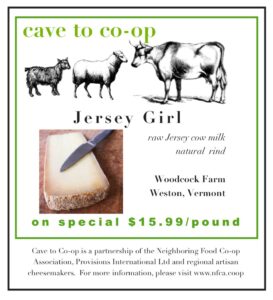
This month’s special cheese is Jersey Girl, Woodcock Farm, Weston, VT.
Named after the farm from which our cow’s milk comes from, this cheese has a semi soft paste and aromas of cultured butter. It has a smooth lingering mouth with a sharp buttery finish.
Jersey Girl is made from – you guessed it – Jersey cow milk which is 20% higher in calcium than Holstein, alongside vitamins A, D, E, and B12. It also has an average of 18% more protein than the average Holstein’s milk. Jersey Girl is a natural rinded tomme and is super buttery, thanks to the Jersey milk. It also has notes of butterscotch, dried hay, and the occasional whiff of barnyard. Natural rinds form with the least amount of intervention. In the temperature and humidity-controlled rooms where cheeses are aged, air naturally dries out the outside of the cheese. Over time, this forms a thin crust on the outside of the cheese which becomes its rind.
Woodcock Farm Cheese Company, where Jersey Girl is made, is located in the Green Mountains of Weston, Vermont. It is a small family farm devoted to creating artisan cheeses from both their own farmstead sheep’s milk and local organic cow’s milk.
Mark Fischer was one of the first apprentices to work with David Major at Vermont Shepherd in Putney, Vermont. Transplants from New York City, the Fischers came to Vermont to raise their family and plant roots in a kinder, more rural world than that of the Bowery. They eventually bought land in Weston, acquired a herd of sheep and built a house, barn and small cheese making facility of a similar design to that of Major Farm. The Fischers use the milk from their own flock of sheep for the sheep cheeses and buy milk from neighboring Jersey Girl Farm for their cow milk cheeses. Though it started with just one room, the creamery has expanded over the years, so that now it is a full-fledged operation, with two walk-in aging spaces, production, packaging and distribution spaces.
Each month, your Neighboring Food Co-ops feature our region’s artisan cheesemakers by offering a specially selected cheese at great price. The Cave to Co-op program is possible because of the partnership between distributor Provisions International, NFCA Co-ops and the many cheese producers in our region. Strengthening our local and regional farmers and producers by supporting artisanal cheesemakers is a key goal of the Cave to Co-op program.
For more information on Cave to Co-op, contact Suzette Snow-Cobb at Suzette@nfca.coop
Look for the “Cave to Co-op” sign in the cheese section at your local food co-op. To find one near you, visit www.nfca.coop/members.
Our shared Co-operative Identity — and your input — has never been more important. Complete this short survey!
“Is the Co-operative Identity adequately defined? Is it widely understood? Are co-operatives operating in a manner consistent with it? Are any changes to the formal expression of our Identity required? Can other tools be developed to enhance co-operatives’ understanding of the Co-operative Identity and stimulate action on their part consistent with it?”
At the 33rd World Co-operative Congress, held in December 2021 in Seoul, the Republic of Korea, the International Co-operative Alliance (ICA) launched an extensive reflection and consultation intended to deepen our Co-operative Identity. Co-ops around the world, their members and employees, activists and policymakers are invited to complete this short survey to help guide this work.
Food co-ops are invited to respond to the ICA’s survey, and to encourage their individual members to participate as well. For more information, visit https://www.ica.coop/en/consultation-coopidentity.
ECRS provides a front-to-back retail automation solution suite built with a class-leading technology platform.
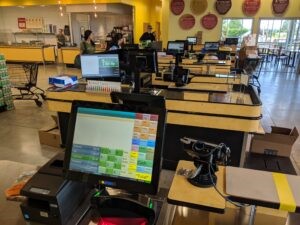
As the leading point of sale system provider to food co-ops in the United States, ECRS maintains a value-focused, customer-centric approach. Our solutions are ideal to handle the unique nature of co-operative grocers. Because we value community engagement and partnership, ECRS is uniquely positioned to add value in thought leadership to partner organizations and individual retailers. ECRS is proud to work alongside NFCA to support co-ops across the Northeast, helping to develop programs facilitating features such as Double Up Food Bucks and partnering on numerous startup projects. We are particularly proud to be working with NFCA start-up members Assabet Co-op Market and Dorchester Food Co-op, both of which held groundbreaking ceremonies in July.
ECRS is an established food and beverage retail solutions provider serving over 4,000 retail locations across North America. ECRS’ revolutionary CATAPULT® system is the industry’s only truly unified point of sale platform. With CATAPULT, the point of sale, self-checkout, e-commerce, inventory, customer loyalty, member management, back office, and enterprise management all share a single transactional logic, called Unified Transaction Logic™. This business logic empowers our retailers by providing actionable business intelligence across the operation. Unifying hardware, software, and services, ECRS offers a holistic retail solution that will increase engagement and improve the consumer experience.
ECRS is committed to perpetual development, expanding value through constant innovation. To that end, CATAPULT is fully-configurable. Optional plug-and-play modules work seamlessly with core applications, offering co-op retailers freedom and flexibility in designing their point of sale
platform. Retailers can easily expand platform functionality as their business grows. Exhaustive research, intelligent design, and rigorous pre-market testing ensure that ECRS products integrate smoothly into existing retail environments. And a commitment to partner engagement ensures those products are the solutions retailers need to stay ahead of the game.
Learn more about ECRS and their services for food co-ops at www.ecrs.com
Think the Farm Bill doesn’t really affect you? Think again – and join us in taking action, together!

With Farm Bill negotiations coming up in 2023, you may ask whether national agriculture policy really affects you? Of course, it impacts the farmers and other producers in our region that supply your local food co-op. But the Farm Bill also affects our environment and the rural Northeast landscape that we often take for granted through conservation and other programs. The Farm Bill also directly impacts consumers in terms of the availability of healthy affordable food, programs supporting families and children on limited incomes, and our ability to know and trust where our food comes from and how it is produced. Food co-ops and farmer co-ops also depend on the resources of the Rural Cooperative Development Grant program funded through this legislation.
This is why the New England Farmers Union is so thankful that the Neighboring Food Co-op Association (NFCA) is an affiliate member — and why we hope you will consider becoming a member as well as a “Friend of the Farmer.” By joining the voices of our producers and consumers, we can influence the food system policies that affect us all. And through our National Farmers Union, we can join our voices with those of other people across the country who care about family farming, supporting local and regional food systems, preserving open space, and growing co-operative enterprise.
In August, the National Farmers Union (NFU) released its Priorities for the 2023 Farm Bill. Meanwhile, the House Agriculture Committee recently posted a Farm Bill Review inviting feedback from consumers, producers, and other stakeholders on how these various programs affect them. We encourage you to review Farmers Union priorities and consider offering your feedback to the Committee on policies that are important to you.
National Farmers Union Priorities for the 2023 Farm Bill
Competition
- Advocate for a dedicated competition title.
- Advance Fairness for Farmers priorities, including:
- Cattle market price discovery and transparency
- Increase enforcement of the Packers & Stockyards Act (PSA)
- Strengthen PSA rules, including addressing retaliation by packers against growers
- Reinstate mandatory country-of-origin labeling (COOL)
- Support local and regional food systems that increase competition and resilience
- Reform checkoff programs to be producer controlled and regularly reviewed
Farm Programs
- Maintain and improve the farm safety net programs in the commodity and crop insurance titles.
- Increase loan rates and other price-based triggers to reflect higher commodity prices and input costs.
- Consider a shift in structure from revenue-based to commodity-based programs.
Permanent Disaster Program
- Address ongoing challenges created by ad hoc disaster legislation and programs, including long delays in implementation and unfair targeting of support.
- Incentivize the use of sustainable/climate-smart farming practices.
- Avoid undermining existing risk management products.
- Apply appropriate eligibility and payment caps.
- Explore ways for past ad hoc disaster programs to be reflected in the farm bill budget and baseline.
Crop Insurance
- Make risk management products more accessible for specialty crop producers and diverse cropping systems.
- Improve Whole Farm Revenue Protection to expand its use and adoption.
- Provide crop insurance discounts to farmers for planting cover crops or using other conservation practices that increase resiliency and decrease risk.
- Authorize a program that incentivizes farmers to voluntarily remove marginal or environmentally sensitive agricultural land from production on an annual basis in exchange for an increased crop insurance guarantee.
Dairy
- Support dairy growth management principles to stem the loss of family dairy farms.
- Strengthen the Dairy Margin Coverage (DMC) program, which, with improvements, can serve as a useful risk management tool.
Climate, Conservation, and Energy
- Increase funding for farm bill conservation programs, which are essential for incentivizing the adoption of soil health and climate-friendly practices. Many of the current programs, such as Environmental Quality Incentives Program (EQIP) and the Conservation Stewardship Program (CSP), are underfunded.
- Maximize effectiveness and ease program application and delivery processes for farm bill conservation programs.
- Ensure integrity of private carbon markets and other efforts to reduce greenhouse gas emissions and make sure that agriculture plays a key role in these initiatives.
- Incentivize the use of managed grazing for livestock through conservation programs.
- Provide crop insurance discounts to farmers for planting cover crops, or using other conservation practices that increase resiliency or decrease risk.
Energy
- Focus on support for biofuels infrastructure.
- Continue to support the Rural Energy for America Program (REAP), which provides guaranteed loan financing and grant funding to agricultural producers and rural small businesses for renewable energy systems (including wind and solar) and energy efficiency improvements.
Research
- Invest in research, outreach, and education to improve and accelerate climate mitigation efforts, such as soil carbon sequestration, and climate adaptation through systems, practices, and tools for farmers.
Other Issues and Concerns
- NFU recognizes the need to increase farm bill funding or baseline. Without an increased baseline, there will be a need to make tradeoffs in priorities and between titles. Given the current policy and political climate, it appears unlikely that there will be an increase in baseline funding.
- It is essential that investments made through the farm bill are defensible to taxpayers.
- NFU urges lawmakers to support a strong nutrition title. NFU stands in solidarity with anti-hunger advocates and the nutrition community, and the time-tested farm bill coalition must stay together to ensure passage.
- Beginning, veteran, and socially disadvantaged farmers and ranchers must be well-served by this farm bill.
- Agricultural workforce policies and immigration laws need to be reformed to address persistent labor shortages.
- Provide mandatory funding for the Rural Cooperative Development Grant (RCDG)
- Program and the Farm and Ranch Stress Assistance Network (FRSAN).
Thanks as always for your support and collaboration as we work to support our region’s family farmers and fishers, and the consumers who depend on them.
Roger Noonan is President of the New England Farmers Union and an organic farmer in New Hampshire. He may be contacted at Roger@NewEnglandFarmersUnion.org
Our Local Farmers Need You!
 National Farmers Union advocates on behalf of nearly 200,000 American farm families and their communities. We envision a world in which farm families and their communities are respected, valued, and enjoy economic prosperity and social justice. Farmers are invited to join the New England Farmers Union chapter – and consumers can join as a “Friend of the Farmer” for just $15. For more information, please visit www.newenglandfarmersunion.org.
National Farmers Union advocates on behalf of nearly 200,000 American farm families and their communities. We envision a world in which farm families and their communities are respected, valued, and enjoy economic prosperity and social justice. Farmers are invited to join the New England Farmers Union chapter – and consumers can join as a “Friend of the Farmer” for just $15. For more information, please visit www.newenglandfarmersunion.org.

For more information, visit https://www.smu.ca/iccm/.


